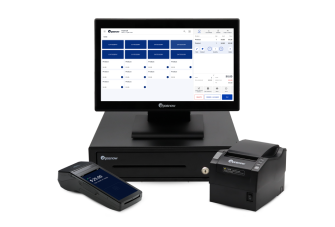Best SumUp POS Alternatives to Enhance Your Business Transactions in 2025
So, you're currently trying to find the best point of sale (POS) system for your awesome business and struggling with what provider to go for (we get it; it’s a jungle out there.) With so many options to choose from, it’s easy to feel like you’ve just been handed a giant, confusing menu and asked to pick the best dish.
You may have heard of SumUp. While it’s certainly an option for business owners, is it the best fit for your specific needs? Does it have everything you need to operate and scale a successful company in your chosen industry?
If you're curious about what else is out there, you’re in the right place. In this guide, we'll break down the features and factors you should be looking out for when looking for a checkout and payment solution. Plus, to make your decision a little easier, we’ve included our top 5 SumUp alternatives that are worth considering for your business in 2024.
Key features to look for in a SumUp alternative
While payment acceptance is super important, the best POS systems offer much more. Here's what to look for in your next solution:
A payment solution that can accept payments online and offline
Your payment solution should be as flexible as your business. The best POS systems allow you to accept payments online and in store, covering all the bases from mobile payments (hello, Google Pay and Apple Pay) to cash payments and credit card payments. A reliable payment provider should also let you process payments via multiple online payment gateways, ensuring you can receive payments anywhere, whether you're on a mobile device, at your online store, or face-to-face.
With mobile apps and payment links, you can seamlessly handle transactions and keep your operations smooth, no matter where you’re doing business. In short, the best payment platform should be equipped to handle contactless payments, bank transfers, ACH payments, and other payment types. Keeping your payment acceptance process as easy as possible improves the customer experience and will help the business grow.
A platform that offers competitive payment processing fees
Transaction fees can add up fast, and no one wants to watch their profits slip away due to high payment processing fees. The best payment systems offer competitive processing fees without hidden charges, giving small businesses the flexibility to keep costs low. Look for a payment solution that offers a clear, transparent pricing structure with no extra fees for features like recurring billing or digital gift cards.
If you're switching from SumUp, you'll want a POS system that allows you to save money on transaction fees while still providing robust payment services. After all, payment infrastructure shouldn’t eat into your cash flow, it should help you make smarter business decisions.
A system that integrates with online payments and mobile apps
Look for a POS system that seamlessly integrates with your CRM (customer relationship management) tools, loyalty programs, accounting system and other helpful business apps. A great POS system should allow you to sync customer data across platforms, so you can track buying behaviors, send personalized promotions, and create loyalty programs that keep your customers coming back. It should also link up with your accounting system, helping you automate processes like recurring billing and sales tax reporting. With these integrations, you can keep all your business operations in sync across multiple platforms, making it easier to make smarter business decisions.
A solution that provides robust security and compliance features
Secure payments are non-negotiable, and any payment system should prioritize payment security as a top feature. Make sure the POS system you choose complies with industry standards like PCI-DSS and offers end-to-end encryption to keep your data safe. Regardless of whether you accept credit cards or debit cards, the best POS systems offer dispute resolution tools to protect your business and your customers.
Features like two-factor authentication and fraud prevention tools will ensure your business stays secure, and you stay compliant with financial institution regulations. A payment processing solution that prioritizes secure payments means fewer headaches for you and more trust with your customers. With payment acceptance features like contactless payments and digital payments, you can rest easy knowing your system is both safe and up-to-date with current trends in payment services.
A system that offers inventory management and point of sale features
The best POS systems offer inventory management and point of sale features that work together, helping businesses manage their operations from one platform. Whether you’re tracking stock levels in real time, receiving payments across multiple payment types, or printing receipts, a system that integrates inventory management with POS software will make your life easier. The right POS solution should give you access to advanced reporting that helps you manage cash flow, track sales, and make smarter business decisions. After all, managing business operations is much simpler when you have the ability to automatically sync everything from sales to stock levels across multiple platforms—saving you time and effort. With a POS system that covers both inventory management and payment processing, you can streamline business operations, improve customer experience, and stay ahead of the game.
Top SumUp alternatives: Overview and comparison
You should be up to speed on the key features to look for in a SumUp alternative. From payment solutions that allow for both online and offline payments to systems offering advanced inventory management and seamless integration with business apps, there's a lot you can get from this tech. Now it is time to look at the best providers that rival SumUp:
Epos Now
First up on our list of SumUp alternatives is us, Epos Now. We’re making waves in the cloud-based POS world, so chances are, you’ve already heard of us. As well as being a POS alternatives we're also brilliant for online payment alternatives.
Our complete POS system has everything you need to run your business, including loyalty programs, online ordering, mobile payment systems, staff management, and inventory tracking. The best part is, we've been called incredibly user-friendly by so many of our awesome customers. You can get up and running with our cloud POS system in minutes.
Founded in 2011 by our visionary CEO Jacyn Heavens, Epos Now was born out of the need for a simple, affordable POS system. Jacyn’s experience working in a bar, where finding the right POS was a constant challenge, inspired him to create Epos Now. Fast forward to today, and we’re helping businesses around the world (from the UK and the US to Canada, Australia, and beyond) streamline their operations.
-
Payment processing made easy: One of our standout features is Epos Now Payments, our integrated payment solution. You can handle multiple payment methods in multiple channels through a single terminal, speeding up transactions and minimizing errors. Everything is managed through one portal, with fixed-rate payment processing and no hidden fees, making it easy to manage costs and receive money.
-
Keep tabs on inventory: Our cloud-based system excels at real-time inventory tracking. You’ll always know exactly what’s in stock, thanks to features like item and order tracking, reordering notifications, and automated ordering processes.
-
Easy employee management: Easily handle scheduling and time tracking to ensure everyone is working the right hours. Sales goal alerts keep your staff on target, and customizable permissions ensure that only authorized employees can access sensitive data.
-
AppStore goodies: Our AppStore offers a wide range of apps to further enhance and customize your system. Some popular apps include:
-
Epos Now Loyalty: Build and manage customer loyalty programs.
-
Epos Now Delivery: Streamline your delivery orders.
-
Order & Pay: Let new customers order and pay from their devices.
-
QuickBooks: Sync your sales and financial data effortlessly.
-
Mailchimp: Automate your email marketing campaigns.
Epos Now is the ideal choice for retail and hospitality business owners who want a secure, easy-to-use POS system. With integrated payment processing, real-time inventory tracking, and robust staff management features, we offer everything you need to get your business running smoothly. And if you ever need assistance, our in-house customer service team is always ready to help.
Square
Next up is Square POS, a cloud-based system that offers a variety of features aimed at simplifying business operations. It includes mobile payment processing and tools for managing your team and customers. It also provides reports and integrates with third-party apps. Here’s the breakdown of Square POS, including key features it offers (and lacks), based on a Forbes review:
Pros:
-
Free to start
-
No monthly fees in the basic plan
-
Hardware options
Cons:
-
Square can freeze accounts if it detects suspicious activity, which can disrupt business operations unexpectedly.
-
Square’s fees can add up quickly if you process a large number of transactions, making it potentially more expensive for businesses with high transaction volumes.
-
Square lacks phone support, so if you prefer speaking with a real person for troubleshooting, this could be a significant drawback.
Stripe
Stripe Terminal isn’t technically a full-fledged POS system, but it does offer some features for retailers. It’s focused more on payment acceptance, with tools for processing credit and debit card payments, managing subscriptions, and handling bookings.
Pros:
-
Customizable
-
EMV-certified card readers
-
Competitive transaction fees
Cons:
-
Compared to most modern POS systems, Stripe has fewer apps and integrations available.
-
Payouts can take longer than expected, which can be problematic for businesses needing quick access to their funds.
-
While Stripe’s flexibility is a plus for developers, the system isn’t very intuitive for those without technical expertise, making it difficult for non-developers to use effectively.
Shopify POS
Next on the list is Shopify POS, which is used particularly for small businesses. It’s designed to integrate seamlessly with Shopify’s online store, allowing owners to manage in-person sales, inventory, and customer data all in one platform. Here’s an overview of the pros and cons:
Pros:
-
Syncs with your online store
-
Includes Shopify online store plan
-
Offline mode
Cons:
-
To use Shopify POS, you must have a paid Shopify website plan, there's no free version available.
-
Many of the more advanced features come with an additional cost.
-
The free trial for Shopify POS has been reduced to just three days, down from the previous 14 days.
Clover
Clover is a point-of-sale (POS) system tailored for small and medium-sized businesses. It provides both software and hardware options that cater to sectors including retail, restaurants, and service providers.
Pros:
-
Offers multiple pricing plans.
-
Provides a free trial.
-
Has hardware options.
-
Suitable for online.
Cons:
-
Applications for the POS system must be done through a sales representative, online applications are not available.
-
Pricing details can be unclear, making comparisons with other systems difficult.
-
No free plan is offered, which might discourage some potential users.
Toast POS
Toast POS is a system designed specifically for restaurants. It comes with features like payment acceptance, inventory tracking, and staff management, alongside additional options such as promo codes and gift cards. While it’s a good fit for eateries, there are some drawbacks to keep in mind.
Pros:
-
Multiple payment methods
-
24/7 customer support
-
User-friendly across multiple locations
Cons:
-
It can be difficult to determine Toast's full cost due to scalable packages and a pay-as-you-go model.
-
If you decide to cancel or switch plans, the fees can be significant.
-
Toast has a poor BBB rating, and there’s a lack of an online presence to help answer questions or resolve issues.
Lightspeed
Lightspeed is a cloud-based POS system with around a decade of operation. While it offers various features, such as inventory management and customer support, its complexity may be a struggle for newer or smaller businesses. Here’s a look at its pros and cons:
Pros:
-
24/7 customer support
-
Dedicated account manager
-
Inventory management
Cons:
-
Lightspeed is generally much pricier than other POS systems, which could be a concern for small businesses looking to keep costs low.
-
Expect to be tied down with long-term contracts, making it difficult to switch providers if the system doesn’t work out.
-
Getting out of the contract isn’t straightforward, leading to unnecessary hassle if you decide it’s not right for your business.
Simply superior POS software
Our point of sale (POS) software is built for growing businesses. Fulfill all your point of sale needs and transform your business with a quality point of sale system from Epos Now.
Choosing the right SumUp alternative for different industries
Different industries need different fits. Here are some tips to help you find the best POS system for your business:
-
Retail? Go for flexibility
If you’re in retail, you need a POS system that can handle lots of different payment methods, keep track of inventory, and run smooth transactions. Look for a solution that can scale with your business as you grow, like the ability to accept cash, cards, and mobile payments all at once. Bonus points if it lets you manage multiple locations! -
Restaurants? Focus on speed and simplicity
When you’re running a restaurant, time is everything. You need a POS system that speeds up ordering, payment, and inventory management. A system that can sync with your kitchen, bar, and front-of-house operations is key. Don’t forget features like easy tipping, online delivery, split checks, and online ordering integrations. A clunky system means hangry customers, and nobody wants that. -
Service-based businesses? Look for customization
For service-based industries (think salons, spas, or consultants), you’ll want something that handles appointments, employee scheduling, and service payments. A POS with a built-in booking system or loyalty program can make your life easier and keep your clients coming back for more. -
Online stores? Go for seamless integration
If your business is online, you need a POS that syncs effortlessly with your e-commerce platform. Look out for a POS solution that allows for easy management of both online and in-store transactions that will save you time and headaches. -
Mobile businesses? Choose a system with portability
For food trucks, pop-up shops, or anyone on the move, a mobile POS system is a must. You need something compact, reliable, and easy to set up at any location. Look for solutions that offer mobile card readers, portable tablet stands, or other mobile devices.
How to make the switch from SumUp to a Epos Now
Switching from SumUp to Epos Now is easier than you think, and we’ve got your back every step of the way. First off, don’t panic. Epos Now is designed to be super user-friendly. All you need to do is sign up, and you’ll be guided through the setup and onboarding process with one of our brilliant reps. You'll also have unlimited access to tons of tutorials and support to help you make the switch smoothly.
Once you’re in, transfer your product list, customer info, and anything else you want from your old system (Epos Now integrates with a lot of tools, so that part should be pretty painless). Plus, our cloud-based system means you can access everything you need from anywhere.
Ready to explore more? Don’t stop here—check out our other comparison blogs to see how Epos Now stacks up against other popular POS systems. Whether you're considering Square, Shopify, or Lightspeed, we've got the lowdown to help you make the best choice for your business:
Your next big upgrade is just a click away!
If you're considering switching from another provider, check out our additional comparison guides:
Join Epos Now for modifiable software and flexible hardware to suit your industry
trusted by over 40,000 businesses worldwide




